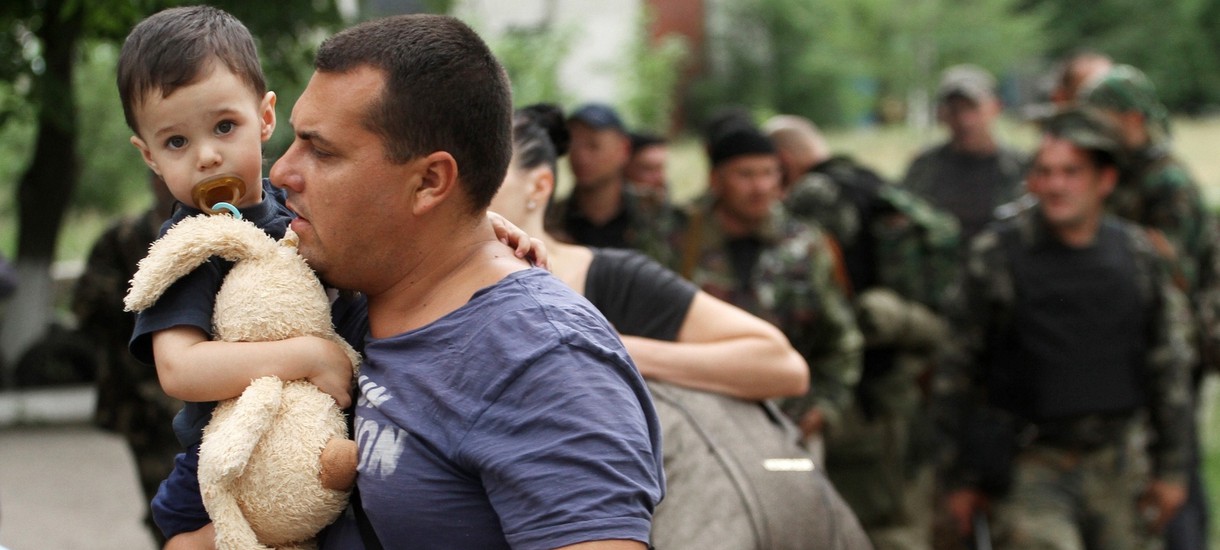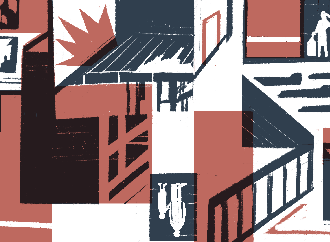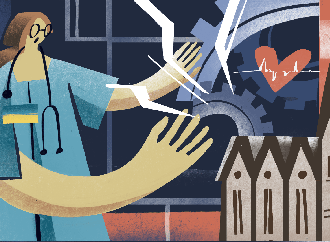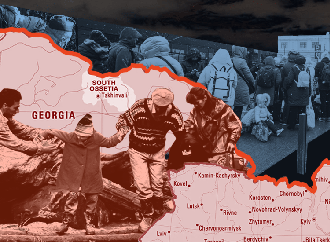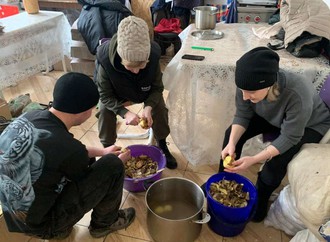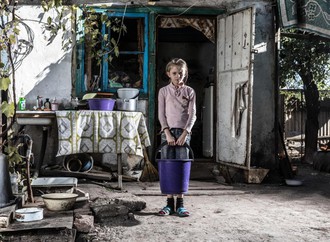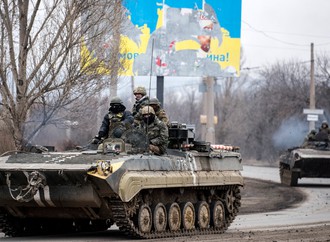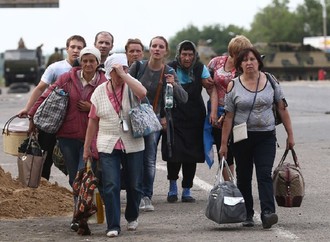We left with mom for three months, or maybe a month. We did not take our things because we thought it’s just, well, a small mess, something that will pass soon. We could not wrap our minds around the idea that something like this could happen in a civilised country. If we are already going towards Europe, the 21st century is around the corner, as it were – but turns out that we went a century back.
Alina, a mother of two in her 30s, living in Kyiv, described how she left her native Luhansk in summer 2014.
To the majority of former Donbas residents I met during my fieldwork in Ukraine and Russia from 2018 to 2019, the Donbas war had been wholly unthinkable until 2014, because it was assumed that wars simply do not happen in “civilised countries.” That is, wars should happen somewhere else and some other time, not here, to us, in a civilised country in the 21st century. This is probably a recognisable attitude to nearly anyone not living in a war zone: we believe that war and death are something that happened in the past or, in the current moment, something that happens to other, less contemporary people, somewhere else. In this sense, incredulity about war coming to one’s doorstep appears a kind of universal experience of conflict (see Maček, 2009). War is so incomprehensible to its sufferers because, Ivana Maček argues, it destroys meaning. Until war breaks out, people perceive normality as a stable, taken-for-granted state; war unsettles this assumption in a profound way, leading to fundamental re-evaluations of worldviews and even sense of self (2009).
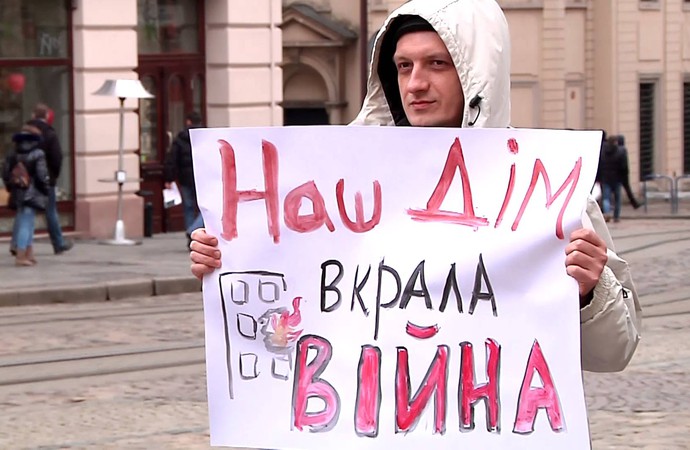
Through conversations such as the one I had with Alina, I came to realise what an important role conceptions of time and temporality play in political events like war. Several aspects of the displaced people’s relationship with time were fundamentally altered by the war and the experience of displacement. Not only were their expectations of a normal life course disrupted by the loss of apartments and jobs and the breakup of habitual social environments, but the events unfolding in 2014 forced former Donbas residents to re-evaluate what kind of country Ukraine actually was. The fact that a war did happen implies that either Ukraine was never a modern, civilised country at all, or that it had gone backwards in time. The war functioned both as a cause and sign of Ukraine stalling on its modernising path towards Europe, an imaginary which tends to be equated with ideas of modernity and progress. War also had an impact on their sense of self: displaced people told me that the war had split their life into two parts, pre- and post-war. They described feeling like they had left their own former self behind and arrived at their new place of residence as a new-born, having to start all over again.
Furthermore, in both Ukraine and Russia, the respective states’ relations with the displaced people became qualified with temporal expectations which were openly resisted in Ukraine but quietly accepted in Russia (for the most part). Whereas in Ukraine the state appeared to keep displaced people in a suspended temporal state, Russian migration policy facilitated the acquisition of permanent statuses to most. This essay explores these transformations and reactions from the point of view of Donbas migrants.
Displacement and the state: “permanently temporary”
Now, six years after the Donbas war flared up, the conflict itself still remains unresolved, while most of the displaced people have come to terms with their personal situation one way or another. Despite the evident regularisation of the situation and displaced people’s adaptations to it, the Ukrainian state and its institutions still insist on portraying the non-government-controlled areas in Donbas and the people who left the region as temporary glitches. Official terminology and legislation speak about “temporarily occupied territories,” and the ministry founded to manage the expected reintegration of Donbas and IDP issues was named the Ministry of the Temporarily Occupied Territories and Internally Displaced Persons. In addition to “internally displaced people” (vnutrishn’o peremishcheni osobi), state institutions and public agencies often use the term temporarily displaced people (tymchasovo peremishcheni osobi). It appeared to many IDPs and civil society actors working on displacement issues that this was no coincidence: the Ukrainian state’s policies indeed appeared to actively turn IDPs into temporary people.
Well, the main problem is that we are considered a temporary phenomenon. This is key, this is the cornerstone. That is, when they finally understand that this is not a temporary phenomenon, but a permanent one - then, perhaps, housing programs and the right to vote will appear, because we are permanent residents, and the attitude towards us will appear as permanent as well.
Svetlana, 30s, from Luhansk, living in Lviv
From the point of view of internally displaced people from Donbas, temporal expectations played a central role in how the Ukrainian government and state institutions related to them as a group of citizens. This was premised on the expectation that they would return to Donbas one day. The expectation manifested in an apparent lack of commitment to permanent solutions to the needs of displaced people, especially with regards to housing, compensation for lost property, and voting rights. To date, no compensations for property lost due to military operations have been made and only a tiny fraction of IDP families have been permanently rehoused with the state’s assistance. In order to prolong their status as IDPs and receive the meagre “targeted assistance” (adresna dopomoha) meant to subsidise living costs, IDPs have to regularly verify their presence in their new place of residence. IDPs have not been able to vote in local elections because of absurd bureaucratic obstacles. All of these policies together spelled out clearly enough to former Donbas residents that they were second-rate citizens in their own country.
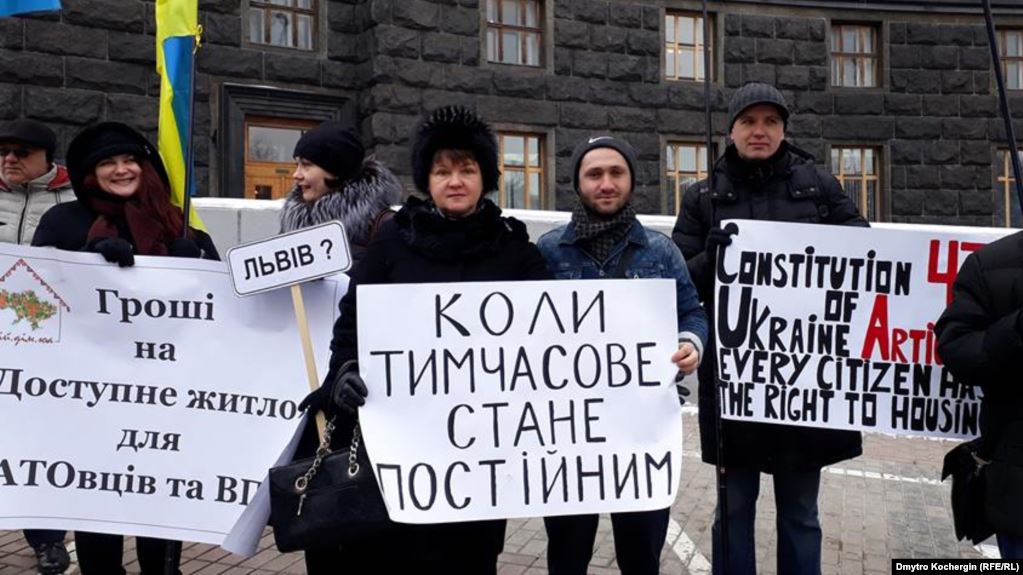
Civil society actors and organisations I met in Ukraine argue that the legal basis for IDP protections already exists in the constitution, but that the state lacks mechanisms for implementing the necessary measures. However, it appears that either confusion or conscious manoeuvring by different government bodies has created a situation where measures to protect or help IDPs, adopted by one arm of the state, become nullified by the regulations of another one. The Ukrainian parliament has passed several pieces of legislation aimed at protecting the rights of IDPs[1], but this legislation has been contradicted by the bureaucratic restrictions and requirements imposed by other government bodies. For example, the Cabinet of Ministers has issued resolutions (Nos. 365, 637 and 964) imposing regulations on benefit payments to residents of non-controlled territories and essentially restricting IDPs’ freedom of movement within the country, by obliging local authorities to monitor and verify the presence of IDPs within their jurisdiction. Failing verification procedures, benefit payments such as pensions could be ceased to IDPs without warning, in obvious contradiction with the constitutionally guaranteed right of citizens to freely choose their place of residence[2]. Pensions payments were halted to people not registered in areas controlled by the government, forcing vulnerable pensioners to exit through checkpoints regularly to claim their pensions. Ukrainian citizens are entitled to receiving their pensions regardless of their physical location, be it abroad or in the non-government-controlled areas of Donbas (International Crisis Group, 2018). This puts the occupied regions of Donbas in a special position in comparison with all other regions in the world.
In the media, ministers have justified such verification procedures with a refusal to finance “terrorism,” alleging that pensions payments to citizens living in the non-government-controlled territories somehow automatically end up in the coffers of separatist authorities. The practices of imposing additional checks as a condition for receiving benefit payments has elicited criticism from various international actors, because they contradict Ukraine’s commitments to international law. These criticisms have not been well received by Ukrainian politicians: “In early 2017, responding to numerous UN exhortations to renew pension payments for residents of uncontrolled areas, the social policy minister [Volodymyr Hroisman] commented that he had ‘never seen such brazen interference in Ukraine’s internal affairs’” (International Crisis Group, 2018, p. 11). In general, it appears that Ukrainian politicians have been more concerned with questions of state sovereignty than with ensuring the rights of displaced people or Ukrainian citizens living in the occupied territories of Donbas.
The limitations to IDPs’ political rights, mentioned above, are a case in point. IDPs lack the right to vote in local elections, because citizens are obliged to vote in the administrative territorial unit in which they are permanently registered. However, the key condition for receiving an IDP certificate (spravka) is having permanent registration in the occupied territories and a temporary registration in the areas controlled by Ukraine. Changing one’s temporary registration to a permanent one would mean losing the IDP certificate and what little financial relief it brings. IDPs are thus being forced to make the choice between gaining the ability to vote and losing their official IDP status, or keeping the status but not being able to vote. While IDPs are allowed to vote in parliamentary and presidential elections, not having a say in local politics limits their chances of influencing the formation and use of budgets in their actual place of residence. In this way, they have no say in projects that could potentially benefit them the most, such as social housing or land use.
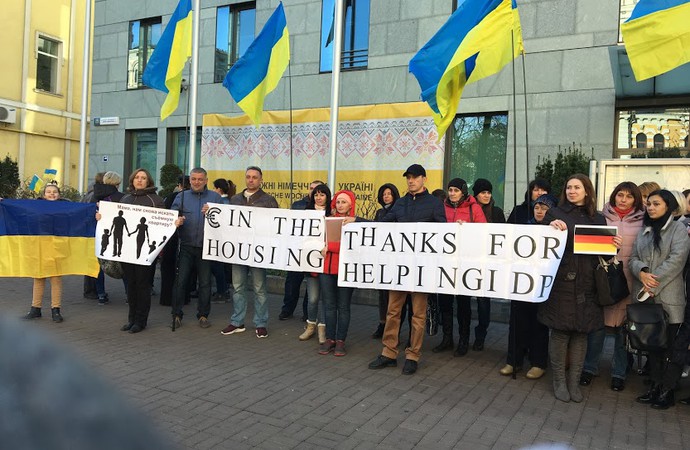
A demonstration organised by IDPs demanding that funds promised by Germany will be used to fund a housing programme. Kyiv, November 2018.
Some of these restrictive decrees and regulations have been successfully challenged in courts for being unconstitutional, but the legal processes are usually lengthy and regularly delayed[3]. However, the practice to require IDP status and registration in government-controlled areas of Ukraine as a condition for pension payments still continue to this day, effectively depriving pensioners living in the occupied territories of what is often their only source of income. Further, applications for compensation for lost or damaged housing at the frontline have been stuck in primary courts for years, likely in order to avoid creating a precedent which would oblige the state to pay compensation to massive numbers of claimants (Abibok, 2019). Over twenty thousand homes have been damaged or destroyed in the government-controlled areas alone since 2014, but, according to Yulia Abibok, only 158 applications for compensation were being processed in courts in spring 2019: “Some cases have already gone to the Supreme Court and been sent back round again. And not a single family has received any compensation from the state.” (2019). A potentially precedent-setting decision expected from the Ukrainian Supreme Court was postponed in 2019 because the court needed “more time to examine the case papers.” Abibok suspects this kind of delaying is a strategy adopted by the courts to avoid taking political responsibility on the thorny political issue.
The effect of this manoeuvring has been the blocking of permanent solutions to IDP problems in Ukraine, essentially leaving IDPs and the whole Donbas region in a suspended, temporary state. Several civil society activists I met during my fieldwork told me, with an air of resignation, that there simply is no political will to guarantee the rights of IDPs in practice. The imposition of temporariness by the state and its institutions led to resentment by IDPs. A very common way of articulating this resentment was the assertion that displaced people in Ukraine are not “resettlers” (pereselentsi) as they are colloquially known, but refugees (bizhentsi), because the state had not helped them in any way, before or after displacement.
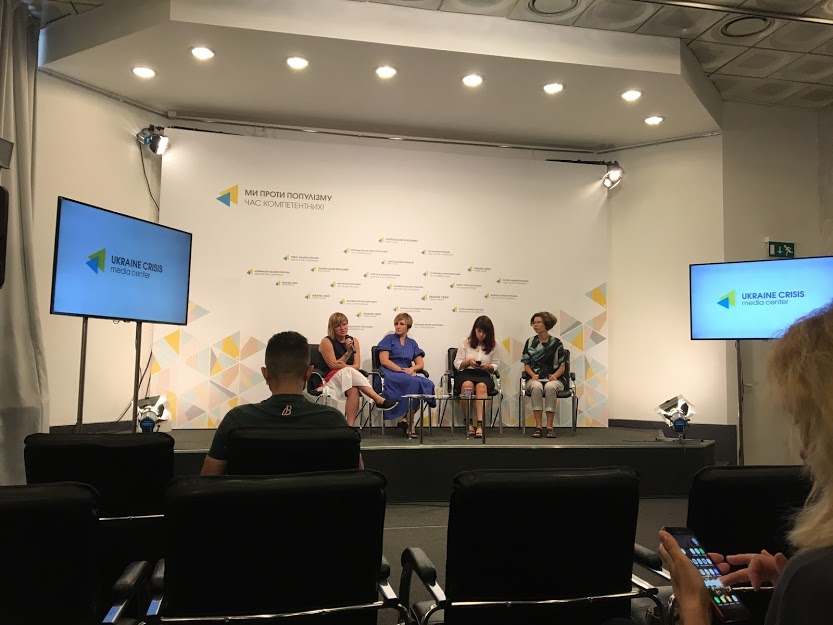
One of the many panel discussions and press events organised to discuss issues concerning IDPs in Kyiv.
It is not within the remit of this essay to conclusively prove what the motivations behind state policies leading to the imposition of temporariness might have been. Some of my informants speculated that politicians wanted to exclude IDPs as an electorate because they might vote against those currently in power. This view has been supported by such academics as Paul D’Anieri, who has suggested that it is, in fact, in the interests of post-Maidan political elites to exclude the whole of Donbas region as an electorate, as voters in Ukraine’s south-eastern regions have traditionally “voted disproportionately for candidates and parties that supported closer ties with Russia” (D’Anieri, 2019, p. 89). This kind of voting behaviour has not been recognised as a consistent position in national politics, but something akin to false consciousness. D’Anieri argues that it is ultimately not in the government’s interests to permanently resolve the crisis in Donbas: maintaining the region’s exclusion may be a precondition for the government’s political success (2019). Thus, temporality or suspension does not concern just IDPs, but the whole Donbas region.
International comparisons
Even if it is possible to find motivations for exclusion predating the conflict in Ukrainian domestic politics, it appears that such “temporalising” effects of state policies, formulated in reaction to war and displacement are not unique to Ukraine[4]. Many Azerbaijani citizens displaced by the hostilities in 1990s in Nagorno-Karabakh have spent decades in an existential limbo, unable to fully adapt to life in displacement or go back to their homes. Some of the Azerbaijani IDPs spent over a decade in tent camps before being rehoused (International Crisis Group, 2012). By the sound of it, state support for IDPs has been more generous in Azerbaijan than in Ukraine, especially after the country’s oil boom, but in many ways it has also been based on the expectation that IDPs would eventually return to their homes; the state has even developed a repatriation programme grandiosely called the Great Return (International Crisis Group, 2012, pp. 3–4). Situations of protracted displacement have persisted in many post-socialist countries as states prefer the return option over other solutions, and international actors tend to withdraw as soon as life-threatening situations are over (Walicki, 2009).
One well-known parallel to Ukrainian IDP policies is Georgia, a postsocialist country with a recent IDP population mainly originating in the 2008 Russo-Georgian war. Georgia was often mentioned as a point of comparison during my interviews with civil society actors, some of whom had even participated on trips to Georgia funded by international donors. Elizabeth Dunn provides a critical look of the kinds of life-worlds created by humanitarian protection from the point of view of IDPs in Georgia, where “displaced people’s attempts to create a normal situation are constantly thwarted by the geopolitics, statebuilding goals, and bureaucratic practices of humanitarian aid.” (Dunn, 2017, pp. 24–25). Even though the active fighting in Georgia lasted for only five days, the consequences of the war became a permanently temporary problem, similarly to Ukraine. At the start of the conflict, a host of non-governmental organisations and humanitarian aid agencies rushed to Georgia, led by the UN, which quickly set up its cluster coordination system. However, Dunn claims humanitarianism, instead of solving the problems of displaced people, has created a regime of “adhocracy” characterised by prolonged uncertainty and chaos (2017). Humanitarian projects based on guesswork, improvisation, and satisficing failed to reintegrate IDPs into society or offer them any certainty about the future; instead, this aid has made the IDPs passive and dependent on the state. IDPs housed in compact settlement villages far from any infrastructure have been unable to find stable work and they have become isolated from the rest of the society. What humanitarianism did succeed in doing was legitimise Georgia’s new neoliberal government by treating it as a responsible partner, and affirm the country’s geopolitical orientation: “humanitarianism in Georgia was intrinsically a state-building project, one that promulgated 'capacity building' for the nation-state as a means to deliver aid more effectively, bind Georgia more tightly to the West as a client state, and create a bulwark against Russian expansionism.” (Dunn, 2017, p. 68).
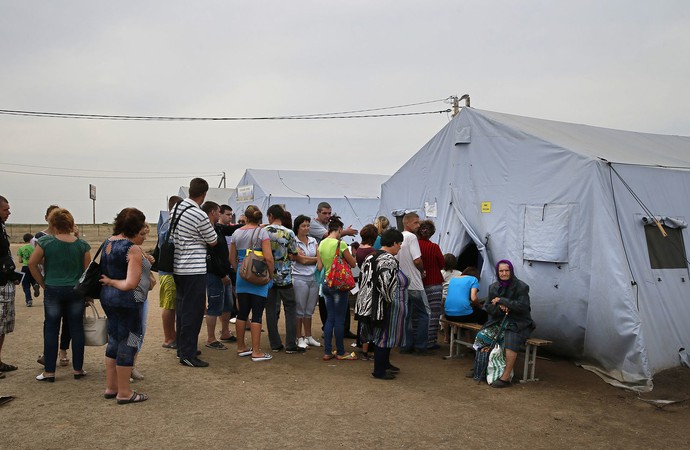
Refugee camp, Rostov Oblast, 2014
There are certain commonalities between the policy response of the Georgian and Ukrainian governments. For example, the post-Maidan governments of Ukraine have been more than happy to engage Western donors in various projects purported to help IDPs, but these projects have been marred with allegations of corruption, and the money has on several occasions failed to reach the intended recipients[5]. There are some major differences between the countries, however: the Ukrainian state did not even attempt to house all the IDPs in a coordinated manner, while resettling displaced people into modular villages was the main aspect of Georgian IDP policy. Also, Ukraine was very quick to set up the IDP registration system in comparison with Georgia. The key difference between Ukraine and many other countries with an IDP population is that while in other contexts the IDPs may well want to return to their former homes out of their own volition, this is most definitely not the case in Ukraine.
A natural point of comparison with regards to Donbas displacement is of course Russia, the country hosting the second largest number of displaced people from Donbas after Ukraine. I spent half of my fieldwork in Russia, where the displaced people’s struggle with temporality took the form of attempting to transform migration status into something permanent. Many displaced people from Donbas initially entered Russia on temporary statuses such as temporary residence permits (razreshenie na vremennoe prozhivanie, RVP), temporary asylum (vremennoe ubezhishche, VU) or utilising the 90 days’ visa free allowed stay in Russia for Ukrainian citizens. Although the allowed status-free stay was quickly extended to 180 days, these kinds of temporary statuses became less and less popular over time, because they imposed limitations on movement and employment, and had to be renewed regularly (Kuznetsova, 2020). Since summer 2014, the Russian state’s policies towards Ukrainian citizens were updated several times, and especially the acquisition of Russian citizenships was radically simplified for Donbas residents. This development reached its apex when in April 2019 president Vladimir Putin signed two decrees opening up the possibility to apply for Russian passports to not only Donbas migrants legally residing in Russia, but also to those still living in either Ukrainian government-controlled or separatist-controlled parts of Donbas[6]. That is, rather than developing the institute of asylum, Russian authorities opted to facilitate citizenship acquisition to this privileged group of migrants. These changes have been described as manifesting an instrumentalist migration policy, one premised on serving the economic needs of Russian regions suffering from aging population and outmigration, rather than humanitarian concerns:
the Russian authorities have tried to control and distribute these refugees and migrants for the benefit of the state, according to principles of selectivity and economic interests – giving privileged access to permanent residency and citizenship to working-age people willing to settle in regions where population growth and more workers are deemed necessary. (Myhre, 2018, p. 1041).
Ethnocultural similarities have also played a role in favouring Ukrainian migrants in Russia; an unnamed migration expert quoted in a RIA Novosti article in July 2014 probably put it all too honestly: “If all these people will stay with us, it will be good. We have always welcomed the migration of Russian-speaking Slavic migrants as an alternative to migrants from Central Asia.”[7] (cited in Myhre, 2018, p. 1029). Largely, then, displaced people from Donbas migrants were seen as privileged migrants whose stay in Russia was encouraged because they presented a solution to demographic problems. Geopolitical considerations no doubt also played role in devising the quick response to mass displacement from Donbas, as Russian authorities were keen to demonstrate both concern for this group of people as well as an ability to deal with mass immigration (Rimpiläinen, 2020).
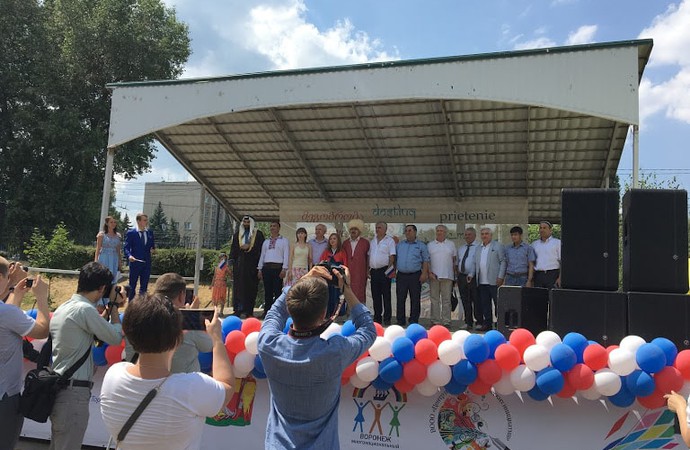
Representatives of different national communities take the stage during Russia Day celebrations in Voronezh, Russia. 12 June 2019.
The helping hand offered to Donbas migrants could be thus seen as a cynical move from the side of the Russian state to advance its own geopolitical and economic interests. However, even if this was so, the policies had concrete consequences to these migrants. It appeared to me that because the Russian state, implicitly or explicitly, encouraged the formalising of migration status by granting citizenships, there was noticeably less resentment towards the state or its institutions among displaced people in Russia than there was in Ukraine. Most displaced people I met seemed to accept the transitional difficulties they were experiencing in Russia if it was conceivable they could obtain Russian passports soon, as citizenship would both facilitate mobility and open up employment opportunities. Donbas migrants in Russia seemed generally less critical of the kind of slot they were offered in society than those in Ukraine: complaints I heard from displaced people in Russia mainly concerned the absurdly long queues applicants had to endure at the State Migration Service (FMS). Still, the frustration with bureaucracy did not inspire direct criticism towards the state or its policies, as it did in Ukraine.
Political attitudes probably do matter here to some extent, as those whose views coincided with either the separatist or Russian leadership tended to move to Russia and often supported the country’s policies vis-à-vis Donbas, at least implicitly[8]. However, political views are not the whole picture. Despite their criticisms, most IDPs in Ukraine made sure to emphasise that they are patriots who made a conscious choice to flee towards Ukraine and not Russia from Donbas. Many displaced people in Russia also recognised that, despite Russian leadership attempting to maintain plausible deniability about its role in the war, part of the Donbas conflict was due to Russian geopolitical interests and that Russia assisted the fledgling republics both materially and with personnel. I believe the crucial factor in creating resentment of the state or acquiescence to its policies among displaced people were indeed the diverging goals of the state and displaced people in Ukraine and the overall synchronicity of these goals in Russia. Ukrainian state policies forced IDPs into a life of temporariness that they tried to escape, whereas Russia facilitated the process through which Donbas migrants became permanent residents.
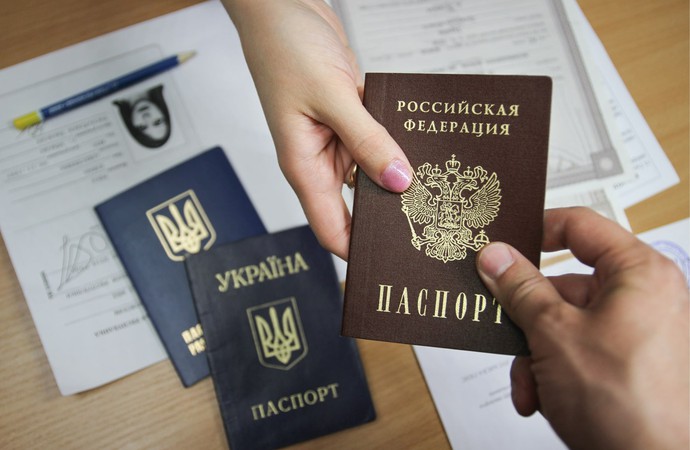
This analysis is supported by the observation that the migrants in Russia who perceived themselves shut out from the route to citizenship were the most critical of their place in society and wanted to return to Donbas. Unlike everyone else I interviewed during my 12 months in the field, two women I met in Voronezh wanted to return to their hometowns in Donbas, because they did not feel welcome in Russia. Both had been struggling with formalising their status in Russia because of lack of resources: even after the application procedures were simplified, jumping through all the hoops in order to get a Russian passport required money and time. Compatriot resettlement programmes, a typical route towards citizenship, are intended for highly qualified migrants in economically or socially useful professions. If migrants are not eligible to apply for this programme, they have to apply through the “usual route,” involving several stages, huge amounts of paperwork, endless queuing at FMS, and spending large sums of money on various certificates and services. At almost every stage they would need to show evidence of employment, which in turn is hard to find without first having some kind of status in Russia. Proof of registration is also required at every stage, which is another permanent headache for many migrants. The reluctance of landlords to register tenants in their flats – as registration would make the tenancy relationship visible to tax officials – means that most tenants have to buy fake registrations (see also Reeves, 2013). Of course, this problem does not concern those wealthy enough to buy their own housing. These struggles bring to fore the implicit class nature of Russia’s immigration system, even for ethnically privileged migrants like people from Donbas.
Temporal and spatial strategies
Temporality thus plays a key role in the relations between the state and displaced people. Humanitarian aid and state policies can create temporariness, like in Ukraine and many other post-socialist countries, or the state may aim to turn displaced people into permanent subjects, like in Russia. The migrants themselves do not always agree with these measures and may devise various ways to counteract the impact of state policies on their lives. In Ukraine, one obvious strategy is refusing to apply for IDP status altogether and thus remaining outside of the state’s view as a displaced person. For the most part, this strategy is feasible for young, able-bodied people with good employment prospects. For the elderly, unemployed, disabled, and those with children, the IDP certificate (spravka) is often a dire necessity and a precondition for receiving any benefits.
To many of my interlocutors in Ukraine, adaptation to the life after displacement depended on a temporal strategy, namely a reorientation in time. In their narratives describing life right after displacement, some of my informants described living in a peculiar temporal mode: simultaneously in the past and the future, but not in the present. They spent the summer and autumn of 2014 regretting things they had lost and thinking about their past life, while anxiously following the news, waiting for the war to end, and worrying about what will happen next. “Living in the future” in this instance does not mean living exclusively through or for future plans, but putting such plans on hold until a better time comes. Vladislav, a father of three in his 40s from Luhansk, explained this idea very well:
[In the beginning] we had a feeling that this should end soon, you know? You live in tomorrow all the time, all the time waiting for something. That is, on the one hand, you have a past where everything was peaceful and calm, where there was enough, well, a financially secure life. (…) You start living either in the past, you understand that you had a lot of things which all disappeared. And [you live] in the future, in the sense that you are waiting for it to end, constantly watching the news. All this, in some kind of inner turmoil. Well, life itself, you understand, only happens in the present day. When you live either in the future or in the past, in fact you don’t live at all.
To break out of this mode, Vladislav and his wife Katia decided to turn their attention to their immediate conditions of life and to stop waiting for the war to end soon. They settled in Kyiv after spending some time living with relatives in Lviv and started a small business. Despite all the uncertainty about their future, Katia and Vlad decided to try for a second child in 2015, rather than wait for a better, more predictable time. Katia also said that she stopped following the news and does not want her children to watch them either, to spare them from all the death and destruction, but also constant anxiety about the future.
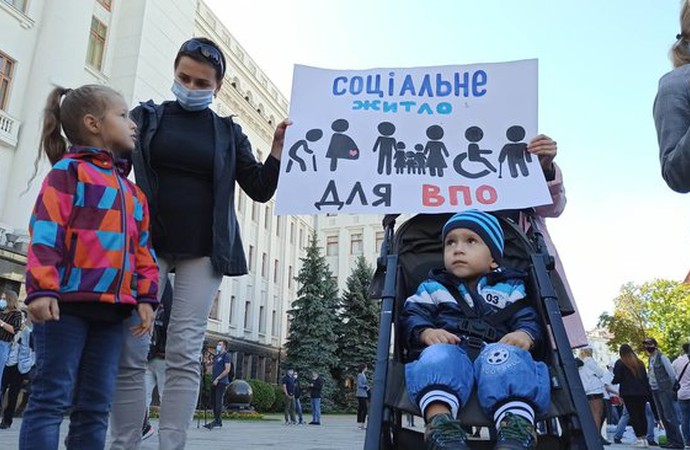
Whereas most displaced people spent the summer 2014 – and sometimes the autumn as well – expecting to go back home soon, by the end of the year many of them realised they would not be returning to Donbas anymore. Some came to this conclusion already by September, as they had to enrol their children to school and thus make a decision where they would spend the school year. This marked a turn from anxious anticipation to a quiet submission to the circumstances; from living in the past/future to living in the present. It appeared to me that this reorientation in time enabled emplacement (the counter process to displacement), at least to the degree that it put an end to discussions about returning. Most displaced people from Donbas have expressed a desire to stay where they are and stop thinking about returning to Donbas in surveys and interviews (Sasse, 2017; Sasse & Lackner, 2018). This was true for the majority of my interlocutors as well, wherever they had moved in 2014. The private work of temporal reorientation was threatened by the state’s expectation of eventual return, eliciting criticism and resentment among IDPs.
For some, especially young people, another strategy to avoid falling in the temporary slot offered by the state was continued mobility, often towards Europe. Kirill, a young man from a small town in Luhansk region, living in Lviv, was thinking about moving to Poland or Czechia with his wife: “My wife of course wants to move somewhere abroad. It is motivated by getting away from here. (...) We just want to forget, just to live somewhere, where the next person is not pereselenets [migrant, literally “re-settler”] and neither are we.” That is, Kirill and his wife somewhat paradoxically wanted to emigrate so as to not be migrants. Of course, this strategy is not unique to IDPs in Ukraine, which lost ten million people to outmigration between 1991 and 2005 (Düvell & Lapshyna, 2015). Even if moving abroad permanently was not an option for everyone, several of my interlocutors had already sent their children to study abroad or were planning to do so.
These kinds of strategies were common because a return to Donbas was deemed impossible. To most of my interlocutors, Donbas has lost its future, especially in an economic sense. Life in Donbas was deemed especially unattractive to children and young people, because “there is nothing for them anymore.” One grandmother characterised Luhansk, which she regularly visits to deliver medicine to friends and relatives, as “a dead city, city of pensioners.” I was thus getting the impression that Donbas is a region increasingly relegated to the personal past of my interlocutors. Letting go of it entails a rejection of the temporary existence seemingly required by the state and a reorientation to the here and now.
References
Abibok, Y., 2019. The war in eastern Ukraine left these people without homes. The state is yet to compensate them. Available 15.05.2020 at: [link].
D’Anieri, P., 2019. Gerrymandering Ukraine? Electoral Consequences of Occupation. East European Politics and Societies, 33(1), 89–108. DOI: 10.1177/0888325418791020
Dunn, E. C., 2017. No Path Home: Humanitarian Camps and the Grief of Displacement. Ithaca: Cornell University Press.
Düvell, F., & Lapshyna, I., 2015. The EuroMaidan Protests, Corruption, and War in Ukraine: Migration Trends and Ambitions. Migration Information Source. Retrieved from Available 15.07.2015 at: [link].
International Crisis Group., 2012. Tackling Azerbaijan’s IDP Burden. Available 13.09.2020 at: [link].
International Crisis Group, 2018. “Nobody Wants Us”: The Alienated Civilians of Eastern Ukraine. Available 13.09.2020 at: [link].
Kuznetsova, I., 2017. One way ticket oder vorübergehende Zuflucht? Flüchtlinge aus der Ukraine in Russland. Russland-Analysen, 331(03.03.2017).
Kuznetsova, I., 2020. To Help ‘Brotherly People’? Russian Policy Towards Ukrainian Refugees. Europe - Asia Studies, 72(3), 505–527. DOI: 10.1080/09668136.2020.1719044
Maček, I., 2009. Sarajevo Under Siege: Anthropology in Wartime. Philadelphia: University of Pennsylvania Press.
Myhre, M. H., 2018. Forced migrant “compatriots” from Ukraine: Accessing legal residency and citizenship in the Russian Federation. Nationalities Papers, 46(6), 1028–1045. DOI: 10.1080/00905992.2018.1488828
Reeves, M., 2013. Clean fake: Authenticating documents and persons in migrant Moscow. American Ethnologist, 40(3), 508–524. DOI: 10.1111/amet.12036
Rimpiläinen, E., 2020. Victims, Villains, or Geopolitical Tools? Representations of Donbas Displacement in Ukrainian and Russian Government Media. Europe - Asia Studies, 72(3), 481–504. DOI: 10.1080/09668136.2019.1672622
Sasse, G., 2017. The Displaced Ukrainians: Who are they, and what do they think? Available 13.09.2020 at: [link].
Sasse, G., & Lackner, A., 2018. War and identity: the case of the Donbas in Ukraine. Post-Soviet Affairs, 34(2–3), 139–157. DOI: 10.1080/1060586X.2018.1452209
UN OHCHR. (2018). Report on the human rights situation in Ukraine 16 February - 15 May 2018. Available 13.09.2020 at: [link].
Walicki, N., 2009. Permanent temporality: In search of solutions for Internally Displaced People in Europe. Available 16.07.2020 at: [link].
Notes
- ^ For example, Law No. 1207-VII adopted in 2014 defined the occupied territories and introduced the category of internally displaced people as well as their rights and freedoms. Law No. 2268-VIII adopted in 2017 is supposed to, among other things, protect the “rights and freedoms of the civilian population in the temporarily occupied territories in Donetsk and Luhansk regions.”
- ^ Law of Ukraine “On the freedom of movement and free choice of residence in Ukraine,” article 2.
- ^ For example, a Supreme Court decision issued in May 2018 found “unlawful the termination of payment of pensions to an IDP on the grounds that it was not ‘provided for by law’.” (UN OHCHR, 2018). Also, the Cabinet of Ministers Decree number 335 imposing additional regulations to pensions payments, introduced in 2018, was declared void by the Kyiv Appellation Court in 2109.
- ^ For a review of internal displacement policies in the post-socialist region, see
- ^ IDP activists have accused central and local authorities of embezzling funds donated by international donors to assist IDPs. See.
- ^ Decree No. 183 Decree No. 187
- ^ RIA Novosti 21.7.2014: ”Ukrainskie bezhentsy: vozmozhnosti poluchit zashchitu v RF segodnia i zavtra”
- ^ In surveys conducted among displaced people, practical factors such as having friends or family in Russia or a chance to find a job, rather than political opinions, have been named as the main motivations for choosing where to relocate from Donbas. See e.g. (Kuznetsova, 2017). During my fieldwork, IDPs in Ukraine tended to assume that those who went to Russia are supporters of LDNR and/or Putin, but I found the picture to be a little more complicated than that.
